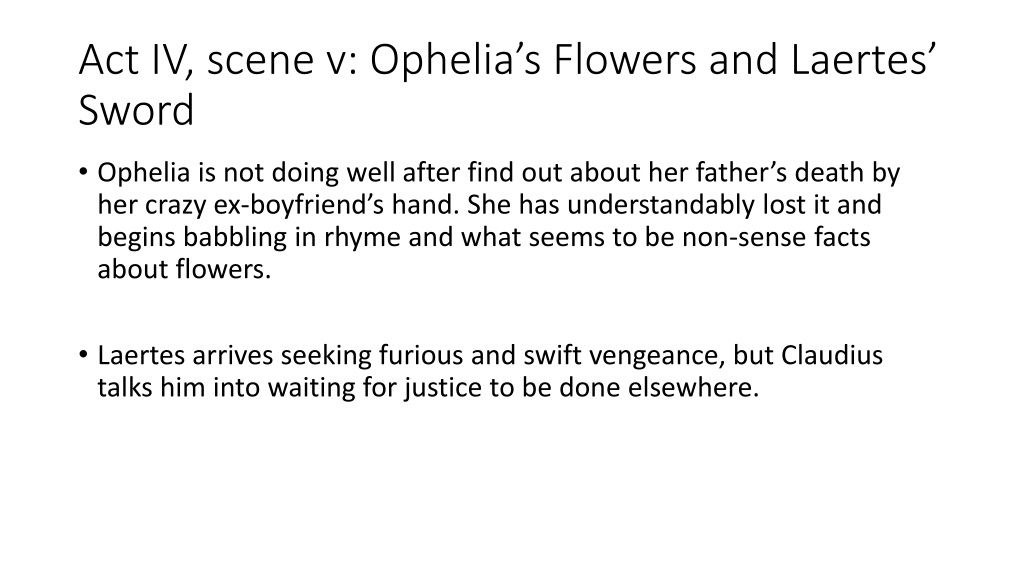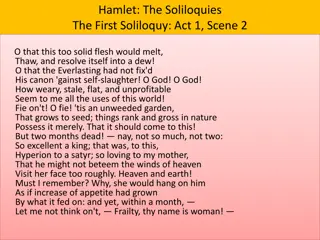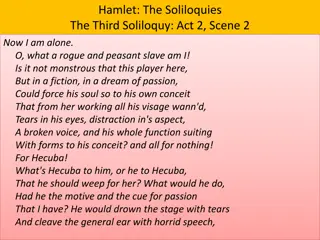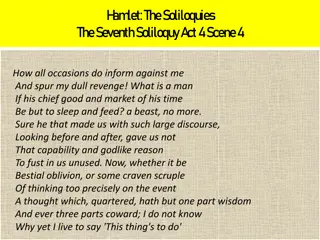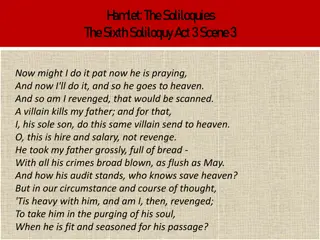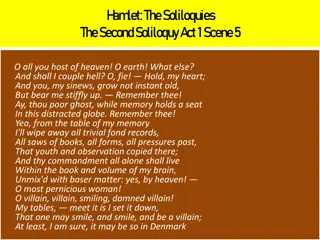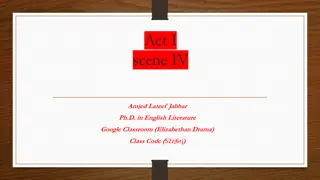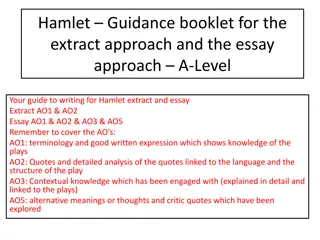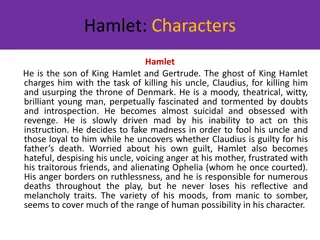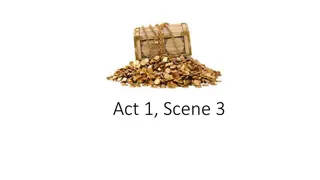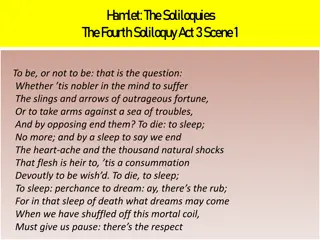Tragic Events Unfold in Act IV of "Hamlet
Ophelia, reeling from her father's death, cryptically speaks about flowers, revealing underlying accusations. Laertes, manipulated by Claudius, seeks vengeance impulsively. Hamlet's unseen pirate adventure raises questions. Ophelia's demise in the brook signifies a tragic turn in the play.
Uploaded on Sep 07, 2024 | 2 Views
Download Presentation

Please find below an Image/Link to download the presentation.
The content on the website is provided AS IS for your information and personal use only. It may not be sold, licensed, or shared on other websites without obtaining consent from the author.If you encounter any issues during the download, it is possible that the publisher has removed the file from their server.
You are allowed to download the files provided on this website for personal or commercial use, subject to the condition that they are used lawfully. All files are the property of their respective owners.
The content on the website is provided AS IS for your information and personal use only. It may not be sold, licensed, or shared on other websites without obtaining consent from the author.
E N D
Presentation Transcript
Act IV, scene v: Ophelias Flowers and Laertes Sword Ophelia is not doing well after find out about her father s death by her crazy ex-boyfriend s hand. She has understandably lost it and begins babbling in rhyme and what seems to be non-sense facts about flowers. Laertes arrives seeking furious and swift vengeance, but Claudius talks him into waiting for justice to be done elsewhere.
Act IV, scene v: Ophelias Flowers Rosemary and Pansies: Ophelia gives these flowers to Laertes, she even cites them as being for remembrance and thoughts. Fennel and Columbine: To the King Claudius, Ophelia gives a brave message. Fennel is the symbol for flattery and columbine is considered the flower for deceived lovers, a symbol of male adultery and faithlessness. Rue: Rue is the symbol for bitterness, thought to be the cause of most abortions in that day, and often connected with adultery. Ophelia gives this flower to the Queen Gertrude as well as keeping some for herself. Daisy: Ophelia picks up and sets down the daisy without giving it to anyone. This is interesting because the daisy is the symbol of innocence and gentleness. Evidently Ophelia thought there was no place for innocence in the Danish court anymore. Violets: Finally, Ophelia says that she would have brought violets but that they all withered when her father died. This is a fascinating note for Ophelia to leave on because violets are the symbol for faithfulness and fidelity. Ophelia s monologue is not just a chaotic ramble about flowers, but a very specific set of accusations spoken out of extreme grief.
Act IV, scene v: Laertes Sword How does Claudius manipulate Laertes into siding with him? What does this tell you about Laertes? What about Claudius? What might Shakespeare have been saying about action-based mindsets like Laertes versus carefully planning like Hamlet?
Act IV, scene vi: The Unseen Pirate Adventure Hamlet sends a letter to Horatio telling of how his ship encountered pirates at sea. Hamlet took his newfound assertiveness to heart and boarded the pirate ship, convincing them to sail him back to Denmark. He also switched Rosencrantz and Guildenstern s letter with one of his own before departing. Why would Shakespeare skip something like this? Think about it from a practical standpoint.
Act IV, scene vii: Ophelia joins the underworld. There is a willow grows aslant a brook, That shows his hoar leaves in the glassy stream; There with fantastic garlands did she come Of crow-flowers, nettles, daisies, and long purples That liberal shepherds give a grosser name, But our cold maids do dead men's fingers call them: There, on the pendent boughs her coronet weeds Clambering to hang, an envious sliver broke; When down her weedy trophies and herself Fell in the weeping brook. Her clothes spread wide; And, mermaid-like, awhile they bore her up: Which time she chanted snatches of old tunes; As one incapable of her own distress, Or like a creature native and indued Unto that element: but long it could not be Till that her garments, heavy with their drink, Pull'd the poor wretch from her melodious lay To muddy death.
Act IV, scene vii: Laertes joins the dark side Too much of water hast thou, poor Ophelia, And therefore I forbid my tears: but yet It is our trick; nature her custom holds, Let shame say what it will: when these are gone, The woman will be out. Adieu, my lord: I have a speech of fire, that fain would blaze, But that this folly douts it.
